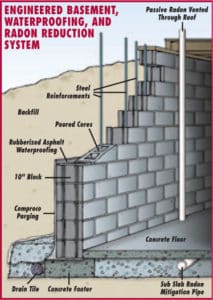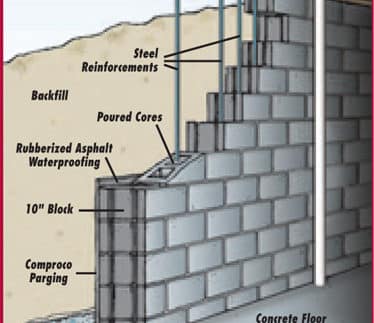
Basement and foundation materials may differ based on the region where your home is built.
Radon is an odorless gas that occurs naturally in the soil from the normal decay of uranium and radium. It enters the home through the basement.
Extended exposure to high levels of radon, according to the US Surgeon General, is the second leading cause of lung cancer.
The good news, there are things you can do to greatly reduce the risk of developing lung cancer caused by radon.
It is far less costly to take steps to address radon during construction than to mitigate the radon after the construction of your home is complete. This is a discussion you will want to have with your builder before finalizing the price and beginning construction.
There are two systems for reducing radon – passive and active. The passive system uses perforated piping below the concrete floor to collect the gas and non-perforated piping is used to vent the gas through the roof.
With the active system, a fan is added typically located in the attic or crawl space to draw elevated levels of radon through the piping and then discharging it above the living areas of the home.
Once the home is finished, you can test for radon. You can engage a radon mitigation company to do the test or do it yourself by purchasing a test kit at a local hardware store. The US Environmental Protection Agency has a resource for finding radon test kits.
I purchased a test kit at Coles Hardware and found the test easy and inexpensive. The kit sold for $10.00 and included two canisters.
The opened canisters were left undisturbed in my basement for 7 days. I then closed the canisters and sent them to the lab for testing along with my check for $40.00.
The results were mailed back giving my family peace of mind that the radon was at a safe level.
Radon levels vary but an estimated 40 percent of Pennsylvania homes have radon levels above the Environmental Protection Agency’s action guideline of 4 picocuries per liter.
By testing, you will know if you need to take further steps such as adding a fan to maintain a safe level inside your home. Additional information on radon is available on the PA Department of Environmental Protection Agency’s website or call the Pennsylvania Radon Information Hot Line at 1-800-237-2366.











